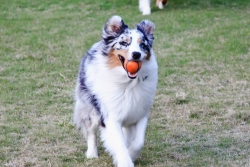A dog’s recall (i.e., her response to the cue, “come”) could be the most important — and potentially life-saving — command she can learn.
The recall is also probably the most public face of the nature of the relationship with your dog. A dog who ignores your cue to come can be embarrassing because her lack of response suggests that her desires and your desires are not in sync.
Having recently been impressed with a presentation about “really reliable recalls in dogs” by a professional trainer on the East Coast, I am highlighting some of the most salient points to consider when working toward having a strong recall in your dog.
Never call your dog in order to have her experience something she is reluctant to do. Think about it. If your dog hates having her nails trimmed and you call her to start a nail trimming session, is this positive reinforcement? If she comes and you raise your voice about something else that she did a few seconds ago, what kind of association is being made with the word “come”? The recall should always be followed by a very positive outcome. If praise and a pat on the head suffice you’re lucky! Others may need to involve a squeaky toy. Or even more commonly, high value treats.
Don’t call your dog unless you’re 99 percent sure she will come.
Don’t poison your dog’s recall by calling her when you know that her limitations make it unlikely for her to come to you. Set your dog up to succeed every time. Later, you can continue to work on strengthening your recall in increasingly distracting environments.
If your dog already has a poor recall, start over.
If your dog has already learned to ignore your existing recall word, you need to start over with a new one, the old cue has been ‘poisoned.’
Add distance OR distraction as your dog gets more reliable.
You can start adding either distance or distraction but you’re likely to fail if you add them both at the same time! Also remember that these two, when you get around to adding them, must be added in very small increments. Don’t be in too much of a hurry.
But what do I do if…?
If…if…if your dog doesn’t come, right? First of all, take note of the fact that you did probably didn’t set the dog up to succeed. Too much distance, inadequate reinforcement, or too much distraction are the likely culprits. Rather than repeating the cue to come, you need go get the dog. No anger, no emotion, no nothing. Just get your dog without calling her again. If you were to call her a second, third and fourth time, you you’d be sending her the message that it’s OK for her to ignore you until she’s ready to come.
The key to a really reliable recall is that the success becomes so frequent that it becomes a matter of muscle memory; the dog simply comes because her body has become conditioned to start moving toward you before she can even consider doing otherwise. This only happens after many, many, many successful recalls.
Hany Hosny shares life with his adopted shelter dog, Stella. He volunteers at animal shelters and shares his relationship-centered ideas on living with dogs, on his popular Facebook page, Smarter You, Happier Dog.

